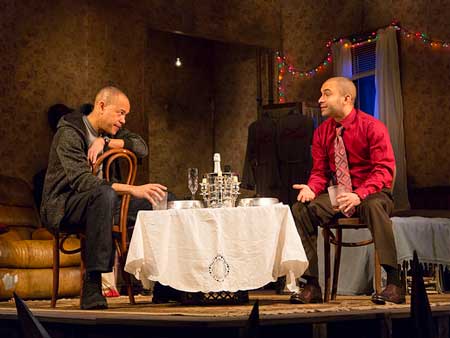Play (2001)
by Suzan-Lori Parks
Directed by Billy Porter
Huntington Theatre Company
Boston University Theater
Symphony Hall area, Boston
March 10 – April 9, 2017
With Matthew J. Harris (Booth), Tyrone Mitchell Henderson (Lincoln)

Matthew J. Harris as Booth
in “Topdog/Underdog”
Photo: T. Charles Erickson
Courtesy of Huntington Theatre Company
Booth and Lincoln, two grown brothers, are living together. Lincoln, a former 3-Card Monte expert, now has a job as a Lincoln impersonator at some kind of themed shooting gallery. Booth, the younger of the two, is an aspiring 3-Card Monte player, working up to it through a more successful career as a shoplifter. The two have a close and connected history, with parents who abandoned them as kids, leaving them to fend together on their own. Dissolution of family and lack of social support spells difficulty at every turn, while the brothers, hunkering down together, strive to survive.
Though I’d never seen this play, I read it years ago and was strongly impressed by its knotty and complex plot, its potent verbal rhythms, and the overall poetry of its imagery and characterizations. Seeing it onstage for the first time in this powerful Huntington Theatre revival, I was not disappointed. Its potency comes through full-force, its live demonstration of the gamblers’ patter and the brothers’ grapplings a vivid enactment of what is likely to become a standard piece of the American theater repertory.
The setting by Clint Ramos is immediately striking and evocative. A cozily domestic interior space is surrounded by a thicket of sharply angular pieces of log, almost as though the enclosed room were on a vessel that had been shipwrecked. It’s a powerful initial image that prevails throughout and, with the combination of warm lighting designed by Driscoll Otto and harshly dramatic sound designed by Leon Rothenberg, combine to produce the effective amalgamation of enclosed domestic quietude surrounded by a raging sea.
That initial image is borne out by the combination of familial warmth conveyed by the two brothers and the simmering struggle that lies between them. The tale, or the drama-poem that the tale conveys, is a heartbreaking one, and its vivid and sharp symbols at every turn signify the ways in which any form of domestic settledness is fraught with potential disaster.
That Lincoln enters with whiteface and in a fake beard and a Lincoln costume, coming from a job in which he is routinely expected to play the victim of tourists who come to revisit the assassination, is a vivid introductory power-punch that plays itself out as the brothers, Lincoln and Booth, so named by their parents, unwind the series of issues that envelop them.
A lot of the play hovers around scenes in which Booth and Lincoln do their 3-Card Monte routines, and it’s extremely entertaining and musical in its own way. It’s a kind of rap in a certain form, a seductive chant with a hypnotic rhythm that draws in the listener and potentially transfixes its victim so that following the shuffling cards becomes undermined by the orator’s facility with words and expertise in delivery. It’s intoxicating and impressive, and the impact of the play’s context, that this form of seduction is a liability not only to its intended audience but to its practitioners, becomes doubly powerful as a result of the power of the incantatory performances.
Both Tyrone Mitchell Henderson as Lincoln and Matthew J. Harris as Booth are strong in their roles, both adeptly musical in their performances and successful in conveying the combinations of resolve and wrath that consume their world. Henderson’s role is more settled and Harris’ is more frenetic, but together they weave a dance that is quietly and pointedly tragic. Direction by Billy Porter, who played Booth in a 2004 production of the play, delivers with a kind of expertise that clearly comes from knowing the work inside out. No credit is given for choreography in this production, though whoever engineered and directed the characters’ movements has done it with creativity and gusto. Harris’ physical gesticulations as Booth, in particular, are striking and deliver a lot of additional energy.
Topdog/Underdog is a play that operates on so many levels that it leaves one simmering afterwards. Like all good poetic dramas, its imagery is clear enough to be consistent and evocative while, at the same time, seductively elusive. One watches this potent production and feels that there is a lot more going on under the hood in addition to the issues of race, family disintegration and sibling rivalry that mark its broad outlines, strongly indicative of its universality as well as its of its power.
– BADMan
Leave a Reply